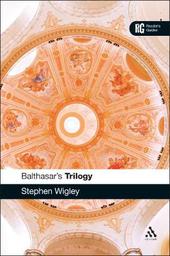
|
Balthasar's Trilogy
Hardback
Main Details
| Title |
Balthasar's Trilogy
|
| Authors and Contributors |
By (author) Revd Dr Stephen Wigley
|
| Series | Reader's Guides |
|---|
| Physical Properties |
| Format:Hardback | | Pages:176 | | Dimensions(mm): Height 216,Width 138 |
|
| Category/Genre | Christian theology |
|---|
| ISBN/Barcode |
9780567034168
|
| Classifications | Dewey:230 |
|---|
| Audience | | Professional & Vocational | |
|---|
|
Publishing Details |
| Publisher |
Bloomsbury Publishing PLC
|
| Imprint |
T.& T.Clark Ltd
|
| Publication Date |
23 September 2010 |
| Publication Country |
United Kingdom
|
Description
This book is an undergraduate introduction to one of the most important works of 20th-century Catholic theology.
Author Biography
Revd. Dr. Stephen Wigley is Chair of the Wales Synod of the Methodist Church, a visiting lecturer and Trustee of St. Michael's College, Llandaff, and author of Karl Barth and Hans Urs von Balthasar: a Critical Engagement (2007).
ReviewsHere we have an excellent introduction to one of the most significant intellectual achievements of the twentieth century, namely Hans-Urs von Balthasar's trilogy on the transcendentals of being: beauty, goodness and truth. In that massive work the Swiss Catholic theologian unfolded the themes of God's glory and its appearance, God's dramatic history with the world and human participation in it, God's cosmic design and the ways of its revelation and human discovery. Now at three interlocking levels -- that of the present book itself, that of its subject's writings, and that of the range of philosophers, theologians and artists whom von Balthasar attended to -- readers will find themselves drawn into engagement with the true, the good, and the beautiful. -- Geoffrey Wainwright, Robert Earl Cushman Professor of Christian Theology, Duke Divinity School, Durham, USA. Readers struggling with the daunting task of getting to grips with Hans Urs von Balthasar's vast and sometimes rather amorphous oeuvre will welcome this wonderfully brief and clear map of his Trilogy. Stephen Wigley sets Balthasar's magnum opus in context, offers an analysis of the key influences on it, and even guides us through the growing thicket of secondary literature surrounding it, but above all he lays out a concise, sympathetic summary of the Trilogy, something which is to be found nowhere else in a single volume. -- Karen Kilby, Department of Theology and Religious Studies, University of Nottingham, UK.
|